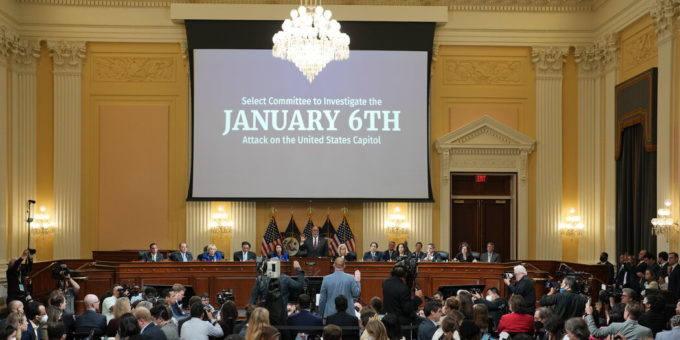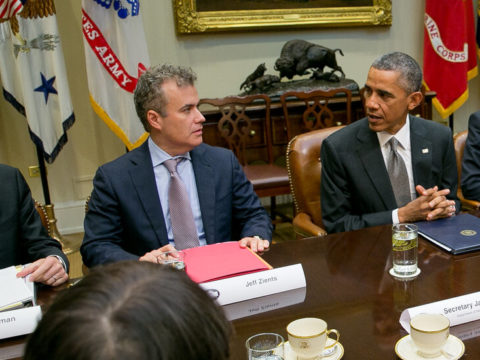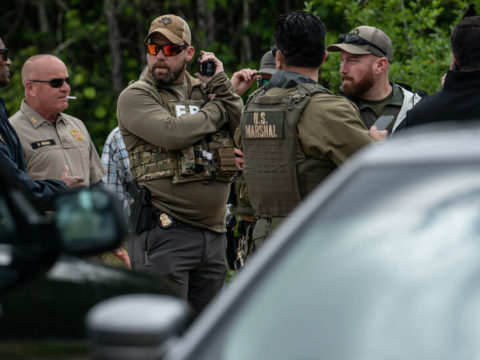
WASHINGTON — The Justice Department has asked the House committee investigating the Jan. 6 attack on the Capitol for evidence it has accumulated about the scheme by former President Donald J. Trump and his allies to put forward false slates of pro-Trump electors in battleground states won by Joseph R. Biden Jr. in 2020.
Representative Bennie Thompson, Democrat of Mississippi and the chairman of the committee, disclosed the request to reporters on Capitol Hill on Wednesday, and a person familiar with the panel’s work said discussions with the Justice Department about the false elector scheme were ongoing. Those talks suggest that the department is sharpening its focus on that aspect of Mr. Trump’s efforts to overturn the election, one with a direct line to the former president.
Mr. Thompson said the committee was working with federal prosecutors to allow them to review the transcripts of interviews the panel has done with people who served as so-called alternate electors for Mr. Trump. Mr. Thompson said the Justice Department’s investigation into “fraudulent electors” was the only specific topic the agency had broached with the committee.
A spokesman for the Justice Department declined to comment.
For weeks, the Justice Department has been negotiating with the Jan. 6 panel about turning over transcripts of its interviews to federal prosecutors. The agency has asked the committee for copies of every transcript of each of its more than 1,000 interviews, while the committee has pushed back, requesting that the department narrow its request.
Mr. Thompson’s comments Wednesday were the clearest indication yet of what the Justice Department is looking for.
“We’re in the process of negotiating how that information will be viewed,” Mr. Thompson said, adding that he believed Justice Department officials would make an appointment with the committee to review the transcripts in person. “We’re engaging.”
The Justice Department has been investigating the scheme to put forward fake electors for months and has issued subpoenas to top Trump lawyers who worked on the plan.
Last month, the committee tied Mr. Trump directly to the scheme and presented fresh details on how the former president sought to bully, cajole and bluff his way into invalidating his 2020 defeat in states around the country.
The committee presented evidence that Mr. Trump sought to persuade lawmakers in battleground states won by Mr. Biden to create the slates of alternate electors supporting him, hoping that Vice President Mike Pence would use them to subvert the normal democratic process when he oversaw Congress’s official count of electoral votes on Jan. 6.
The plan appears to have been set in motion just days after the election, when a pro-Trump lawyer, Cleta Mitchell, sent an email suggesting the idea to John Eastman, another lawyer close to Mr. Trump.
Key Revelations From the Jan. 6 Hearings
By Nov. 18, 2020, another pro-Trump lawyer, Kenneth Chesebro, had joined the effort, writing a memo suggesting that the Trump campaign should organize its allies in several swing states to draft fake slates of electors. Around Thanksgiving, still others signed on to the plan, including Rudolph W. Giuliani, Mr. Trump’s personal lawyer, and Mark Meadows, the White House chief of staff, according to a recorded deposition from Cassidy Hutchinson, an aide to Mr. Meadows.
Eventually, the Republican National Committee was brought in as well, Ronna McDaniel, the group’s chairwoman, said in a recorded deposition played at a hearing last month.
Ms. McDaniel testified that Mr. Trump had called her and put Mr. Eastman on the phone “to talk about the importance of the R.N.C. helping the campaign gather these contingent electors.”
All of this was allowed to go forward, the committee said, despite the fact that several lawyers for the Trump campaign believed it was illegal.
The committee has also accumulated evidence about the scheme from the so-called alternate electors themselves, issuing subpoenas to more than a dozen of them. Some of those who received subpoenas, including electors from Georgia, have complied and sat for interviews with the panel.
In recent weeks, the panel learned that two people called Ms. Hutchinson in what she characterized as an attempt to influence her testimony. Then, the committee revealed on Tuesday, Mr. Trump personally called a witness — though he did not reach the person, who notified their lawyer — prompting the panel to refer the matter to the Justice Department.
“It’s highly unusual,” Mr. Thompson told reporters on Capitol Hill on Wednesday. “That’s why we, more or less, put that in the hands of the Justice Department.”
Senator Mitt Romney, Republican of Utah, said some Republicans had tried to dismiss the matter by suggesting that Mr. Trump might have accidentally dialed the witness.
“But if the former president was trying to interfere with a witness, that would be, obviously, a very serious allegation,” said Mr. Romney, who voted last year to convict Mr. Trump on the impeachment charge of incitement of insurrection and remove him after the Jan. 6 attack.
The committee’s focus on potential witness tampering by Mr. Trump appears to be an effort to prod the Justice Department to investigate the former president for potential crimes. At each of its recent hearings, the panel has presented evidence that its members believe could be used to bolster criminal charges against Mr. Trump. The committee has provided details, including about the fake electors, that could be grounds for charges of conspiracy to defraud the American people, falsifying documents and obstructing an official proceeding of Congress.
Witness tampering would be yet another avenue for prosecuting the former president. Mr. Trump has a long history of making statements or taking actions that can be read as efforts to interfere with ongoing investigations targeting him.
In April 2018, he called his former personal lawyer, Michael D. Cohen, shortly after Mr. Cohen’s apartment, office and hotel room were searched by the F.B.I. and urged him to stay strong, a person with knowledge of the call said.
He also made statements — in public and on Twitter — that Robert S. Mueller III, the special counsel investigating a possible conspiracy between the Mr. Trump’s campaign and Russian officials, considered possible acts of obstruction of justice. Those included posts on Twitter asserting that Mr. Cohen would never turn on him after Mr. Cohen was clearly under investigation.
Mr. Mueller’s team, which did not have the power to indict a sitting president, ultimately did not state whether it believed Mr. Trump had obstructed justice in the 11 instances it examined, instead laying them out extensively in the 448-page report it issued.
Maggie Haberman, Emily Cochrane and Glenn Thrush contributed reporting.












